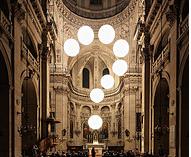 By Daniel Burke
By Daniel Burke
Religion News Service,
After years of warnings from Anglican leaders, Saturday’s (Dec. 5) election of a lesbian bishop poses a stark question for the Episcopal Church: Does it want to continue to be a full member in the global Anglican Communion, or go its own way? In the coming months, more than 100 Episcopal dioceses and bishops will answer that query by confirming or rejecting the election of the Rev. Mary Glasspool as suffragan (assistant) bishop of Los Angeles.
Glasspool, 55, has been with her partner since 1988, according to a biography she provided to the Diocese of Los Angeles; she is poised to become the second openly gay bishop elected in the 2.1 million-member Episcopal Church.
But a majority of bishops and standing committees in the Episcopal Church’s 110 dioceses must vote to give their “consents,” or confirmation to Glasspool’s election before she can be consecrated a bishop. Because that process involves the breadth of the church, it is likely to be an accurate reflection of Episcopalians’ willingness to defy, or heed international pressure.
Within the U.S., the confirmation process has become more politicized in recent years, as the Internet has fostered online campaigns against candidates. Two elections have been nullified in the last two years, though one of the bishops was later re-elected.
On Sunday, the spiritual leader of the Anglican Communion, Archbishop Rowan Williams, strongly and swiftly warned Episcopalians that confirming Glasspool “will have very important implications.”
Glasspool’s election “raises very serious questions not just for the Episcopal Church and its place in the Anglican Communion, but for the communion as a whole,” Williams said.
Williams lacks the authority of a pope to summarily excommunicate churches or members that stray from the fold, but he has proposed a two-track system that could significantly reduce the Episcopal Church’s role in the communion.
“I think it’s a clear warning that we need to think seriously before giving consents,” said Bishop Edward Little of the Diocese of Northern Indiana. “Clearly what Archbishop Rowan is implying is that if the American church goes forward and ordains a second person living in a same-sex partnership as bishop then it will damage, perhaps permanently, our place in the communion, and contribute toward its unraveling.”
Little is one of about 15 bishops who have pledged to abide by a moratorium on gay bishops, and so will not consent to Glasspool’s election, he said in an interview on Monday.
Archbishop Peter Jensen of Sydney, Australia, said Monday that Glasspool’s election gives Williams “every reason” to “dissociate the Episcopal Church” from the Anglican Communion and to instead recognize a conservative breakaway church, the Anglican Church of North America, as the legitimate U.S. branch of Anglicanism.
The threats from Williams and other Anglican leaders have been steadily rising in intensity ever since Episcopalians elected V. Gene Robinson, an openly gay priest, as bishop of New Hampshire. Because his election fell within 90 days of the church’s triennial General Convention, Robinson was confirmed by delegates and bishops at the assembly, instead of the process facing Glasspool.
In many parts of the Anglican Communion, which has 77 million members and includes the Episcopal Church as its U.S. branch, homosexuality is viewed as sinful. In Uganda, for example, Anglican leaders have refused to condemn a proposed law that would severely punish homosexuality and people who counsel gays and lesbians. The church did say, however, that homosexuals should not face the death penalty.
In contrast, large majorities of U.S. bishops and delegates voted in July to lift a three-year-old moratorium on gay bishops and blessing same-sex unions, despite pleadings from Williams not to do anything that would “push us further apart.”
Episcopalians have begun to tune out warnings from Williams and other Anglican leaders, said Jim Naughton, spokesman for the Diocese of Washington. “If the sky is falling, it’s been falling for a long time,” he said, “and it doesn’t appear any closer.”
The Episcopal Church has said for years that it is committed to both the Anglican Communion and the full inclusion of gays and lesbians, said the Rev. Jo Bailey Wells, a professor and director of Anglican studies at Duke Divinity School in Durham, N.C. Glasspool’s election is, in a sense, a fork in the road.
“I think Williams’ statement points out the incommensurability of both agendas,” she said. “Episcopalians are prone to deny the consequences of their actions, because they so believe in what they are doing that they don’t believe that others do not believe.”
As Glasspool’s confirmation moves to local dioceses across the country, the votes of church bishops should be watched closely, said the Rev. Kendall Harmon, a conservative theologian from South Carolina.
Williams leaned on the bishops in his statement, reminding them that they had once agreed to “exercise restraint” when faced with the possibility of electing another gay bishop.
“It’s the bishops that tend to be more institutional and seek a higher or larger view,” Harmon said. “They have some sense of the international church. That’s why Rowan singled them out.”
Disclaimer: Articles featured on Oregon Report are the creation, responsibility and opinion of the authoring individual or organization which is featured at the top of every article.

